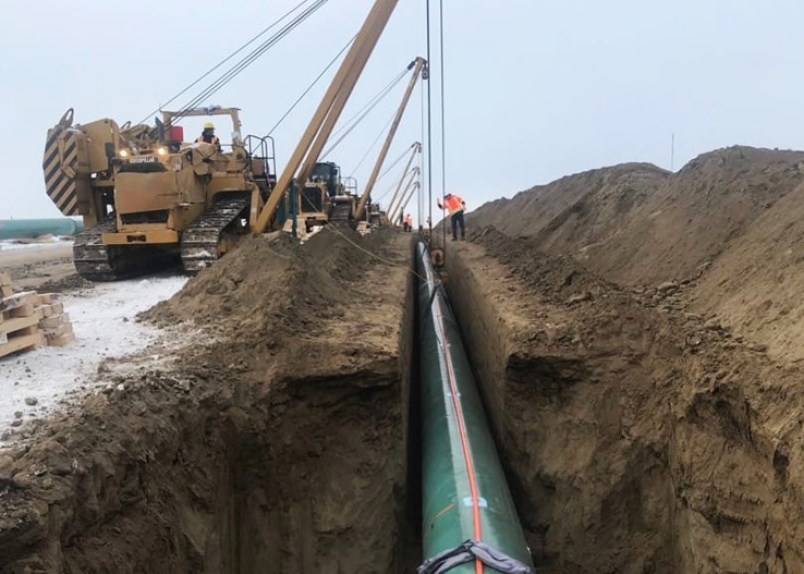Trans Mountain has run into another snag with its multi-billion dollar pipeline construction project after work was halted to deal with an equipment failure during placement of pipe under the Fraser River from Surrey to Coquitlam.
Now the federally-owned company is seeking approval to re-drill part of the route under the river to avoid disturbed ground, pushing the route eight metres further east into Coquitlam.
Trans Mountain has applied to the Canadian Energy Regulator (CER) for approval to change the route slightly from the approved route to accommodate a new drilling path of about 332 metres along the final leg of the 1.5-kilometre under-water route.
According to the application, the revised route requires an expansion of the right of way by approximately 10 metres in width, for a total of 20 metres.
“The first attempt at the Fraser River HDD (Horizontal Directional Drilling) ended with a mechanical failure of the HDD drill pipe as it was pulling the product pipe into the bore hole. Trans Mountain ceased pipeline installation activities for the Fraser River HDD pending the redesign and regulatory approval of the Revised Route,” the application states.
If the change is approved, the pipeline will continue to pass under the Mary Hill Bypass, but will be constructed about eight metres closer to the Forensic Psychiatric Institute lands before turning west, back under the bypass towards Hartley Avenue and United Boulevard.
A spokesperson for the company stated the change was a “minor deviation” that is “necessary to mitigate challenges with the current drill path.”
However, an environmental group says the proposed change is another sign the project is off-track.
Dr. Tim Takaro of Protect the Planet Stop TMX said the drilling problem is just one more issue having to be dealt with by the $12.6 billion project, putting taxpayers on the hook and lowering public confidence in the project.
Takaro noted the drilling issue surfaced not long after a sink-hole was found on the Mary Hill bypass near the pipeline construction work and a few weeks after drilling fluid was released into a Coquitlam water course.
“They are rushing and trying to catch up because they are way behind, and cutting corners which threaten the river,” said Takaro.
He said the route change could have been avoided if more study had been done on the original route and a different drilling method other than the Horizontal Directional Drilling method used to dig the bore hole for the pipe.
Takaro said the test bore holes for the route were well outside of the actual route from Surrey through Coquitlam.
“They didn’t adequately characterize the soil,” he said.
Trans Mountain pulls out and tries again with drilling under Fraser River. World's greatest salmon river subjected to 'trial and error' as they fumble and spew toxic by-waste in the process. pic.twitter.com/aEwvmbadr6
— PPSTMX (@PPSTMX1) January 4, 2022
However, the company maintains that the route and equipment received regulatory approval.
“Our construction methods for the Fraser River HDD have been reviewed and approved by the CER. Pre-construction subsurface investigations align with conditions encountered during construction,” the media relations spokesperson said in an email.
Some of the work being done on the revised route may address recent settlement and fluid release problems, as well.
According to the application, the proposed crossing design for the revised route will include the installation of up to 130 metres of casing to be installed to “protect the Mary Hill Bypass from settlement and potential fluid releases.”
As well, the carrier pipe will be installed in a single section instead of two, eliminating the need to stop drilling operations to weld on the second section. This work “further minimizes risks of potential failure,” the application states.
Still, other concerns are being raised about the revised route.
Among them is a contention by Kwikwetlem First Nation that there could be archeological issues with the altered route, according to Trans Mountain’s change application.



